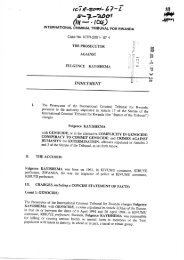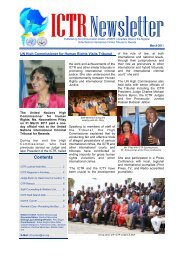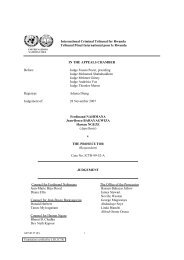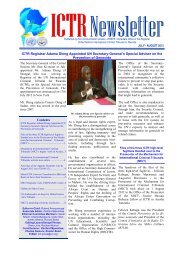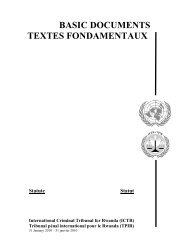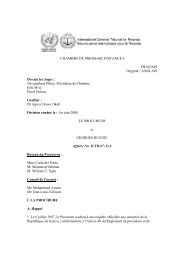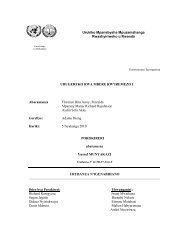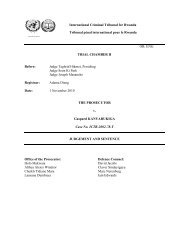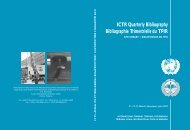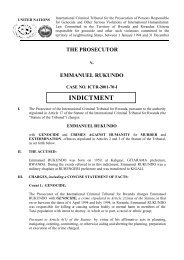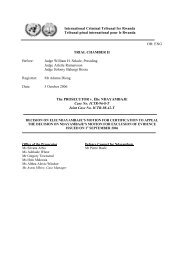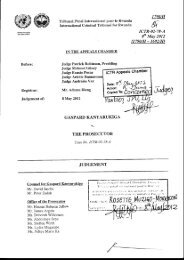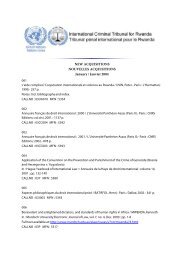Report of Proceedings - International Criminal Tribunal for Rwanda
Report of Proceedings - International Criminal Tribunal for Rwanda
Report of Proceedings - International Criminal Tribunal for Rwanda
You also want an ePaper? Increase the reach of your titles
YUMPU automatically turns print PDFs into web optimized ePapers that Google loves.
Mr. Ocampo concluded by noting the need <strong>for</strong> local and global communities to be both<br />
served and linked through standards <strong>of</strong> international justice. The cases prosecuted by<br />
international criminal tribunals may seem remote from the everyday experience <strong>of</strong> citizens<br />
living in democratic and peaceful States. But these citizens need to understand that there is no<br />
safe haven <strong>for</strong> life and freedom if we fail to protect the rights <strong>of</strong> any person in any country in<br />
the world. Mr. Ocampo quoted from the preamble to the Rome Treaty, which underscores the<br />
need to punish and deter the most serious crimes and declares that this must take place through<br />
both national and international action and co-operation. Mr. Ocampo declared that this is our<br />
common duty and that the prosecutors’ colloquium will allow those gathered to fulfil this duty<br />
more effectively.<br />
IV. Challenges <strong>of</strong> Conducting Investigations <strong>of</strong> <strong>International</strong> Crimes<br />
Moderator<br />
Mr. Hassan Bubacar Jallow, Prosecutor, ICTR<br />
Presenters<br />
Mr. Bernard Muna, Former Deputy Prosecutor, ICTR; Hon. Navanethem Pillay, Appeals<br />
Judge, ICC; and Ms. Binaifer Nowrojee, Lecturer, Harvard Law School and Senior Researcher,<br />
Human Rights Watch<br />
Panellists<br />
Mr. Richard Renaud, Chief <strong>of</strong> Investigations, ICTR; Mr. Gavin Ruxton, Chief <strong>of</strong><br />
Prosecutions, ICTY; Mr. Serge Brammertz, Deputy Prosecutor (Investigations), ICC; and Dr.<br />
Alan White, Chief <strong>of</strong> Investigations, SLSC.<br />
PRESENTATIONS<br />
This first session <strong>of</strong> the prosecutors’ colloquium addressed some <strong>of</strong> the common challenges<br />
that arise during the investigation <strong>of</strong> crimes by international courts and tribunals. Participants<br />
had the opportunity to exchange experiences and suggestions <strong>for</strong> improving the crucial work<br />
that they carry out in the international justice system. The session consisted <strong>of</strong> three<br />
presentations on topics relevant to the session theme, followed by the remarks <strong>of</strong> four<br />
individuals intimately involved in the investigative work <strong>of</strong> their courts.<br />
“The Early Challenges <strong>of</strong> Conducting Investigations and Prosecutions be<strong>for</strong>e<br />
<strong>International</strong> <strong>Criminal</strong> <strong>Tribunal</strong>s,” presented by Mr. Bernard Muna<br />
Mr. Muna began by noting that ad-hoc tribunals were political creations and, as such, raised<br />
expectations in the international community that were not always realistic. Speedy results were<br />
expected but investigations encountered many obstacles that do not exist in domestic<br />
jurisdictions. Most <strong>of</strong> those suspected <strong>of</strong> mass crimes had fled <strong>Rwanda</strong> and it was not a simple<br />
task to track them down. The ICTR does not have a police <strong>for</strong>ce and thus has to depend upon<br />
the co-operation <strong>of</strong> national police <strong>for</strong>ces and en<strong>for</strong>cement systems. While some States co-<br />
7




